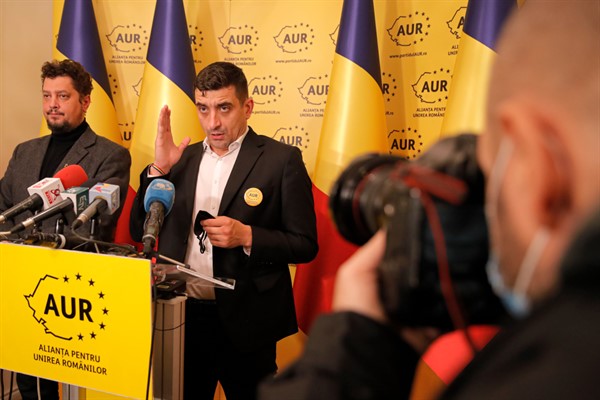The results of Romania’s parliamentary elections earlier this month were thought to be something of a foregone conclusion, with a victory expected for the ruling center-right National Liberal Party, or PNL. However, record-low voter turnout of just 32 percent saw the leftist opposition pull off an upset, with the Social Democratic Party, or PSD, taking 30 percent of the vote to the PNL’s 25 percent. That makes the PSD the largest party in Parliament, with 110 seats in the lower house, though it will remain in the opposition, as the PNL have agreed to form a governing coalition with two smaller parties. Still, Prime Minster Ludovic Orban, of the PNL, resigned the day after the polls to take responsibility for the disappointing results. The PNL-backed president, Klaus Iohannis, named Finance Minister Florin Citu, a former economist and investment banker, as the new prime minister-designate this week.
The low proportion of voters willing to go to the polls reflects the impact of the COVID-19 pandemic, but also popular disengagement with politics in Romania. The PSD has a highly motivated base of core supporters, so it tends to perform better in low-turnout scenarios. The party has been associated in the past with efforts to erode Romania’s independent institutions and high-profile graft scandals, and more recently with Donald Trump-like rhetoric attacking the “deep state” and the European Union. It was in power until last year, when Prime Minister Viorica Dancila’s government was ousted in a no-confidence vote, months after the PSD’s former leader, Liviu Dragnea, was sentenced to three and a half years in prison for corruption.
For many observers, the Dec. 6 elections were most striking for the emergence of a new far-right party, the Alliance for Romanian Unity, or AUR—an acronym that means “gold” in Romanian. It took nearly 9 percent of the vote, and will enter Parliament as the fourth-largest grouping. Romania has not had a far-right presence in its legislature since 2008, when the previously influential Greater Romania Party dropped below the 5 percent electoral threshold required to enter Parliament.

